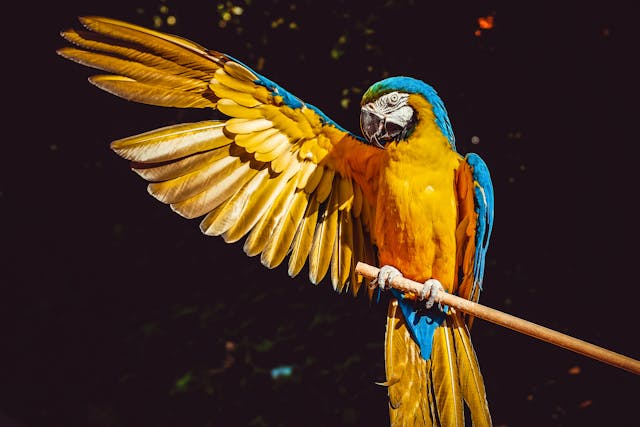If you’ve scrolled through social media, chances are you’ve come across a video of a parrot showing off. These colorful birds typically have lots of tricks in their repertoire. They make extremely interesting pets and, if you’re a bird lover, you won’t mind the extra work involved in parenting them. Here’s what you need to know before you pick out a parrot.
A variety of species
There are hundreds of species of parrots, each with a distinct combination of sizes and colors. It’s important to keep in mind that each parrot will have their own emotional, nutritional, and physical care needs. Diets will differ, as will the amount of room they require to thrive as pets. Some breeds tend to be more playful than others or better able to learn a few words in whatever language that’s spoken in the home.
It’s critical for prospective parrot parents to be aware of the specific requirements of the species they’re adopting. African Greys are among the most popular and, if you want to carry on a conversation or teach them a few dance moves, they’re ready to please. Cockatoos can pick up human language, but they can be very demanding of your time and will become stressed if this need isn’t met.
Parrots live a long time
The longevity of these birds should be taken into account. In this respect, having a pet parrot is quite different compared to a cat or dog. Since parrots can easily live to 20 years of age, with species like Macaws living to 100, planning for their care after you die is necessary. If you want a companion that will be by your side through all of the major transitions in your life, you owe it to them to make sure that they are well taken care of if they outlive you.
Parrots are very intelligent
A big reason why so many people gravitate toward parrots is that they’re exceedingly smart. Would you believe that their intelligence rivals that of most preschool-age children? Their ability to mimic human speech, animal noises, and a remarkable range of other sounds is legendary. Research has found they can follow instructions better than most dogs, counting up to six and identifying an item by its color, size, shape, and substance.
They also have a highly creative brain and have been observed making up their own words for things. That said, particular kinds of parrots find it easier to simply whistle or copy sounds they hear all day such as the phone ringing, someone coughing, or a kettle coming to a boil.
Your attention is required
Having a very quick-witted pet means they’ll want to engage with you a lot. Certainly, they don’t need daily walks like their canine cousins, but they do normally want to be let out of their cage and be involved in what you’re doing. You’ll find them content to ride on your shoulder as you dust the furniture or sit on the couch behind you as you watch T.V. In addition, be sure to participate in a bit of playtime with your parrot every day.
Your parrot will bond with you quite readily, and this may lead to a bit of panicking on their part if you go outside where they can’t see you. To help reduce separation anxiety when you’re not there, leave a radio on low and be sure to give your bird lots to keep them occupied. If they don’t have enough toys and are alone for long stretches of time, they’ll become bored, which may lead to a few behavioral problems.
Parrots can be noisy and destructive when the mental and physical stimulation they have is insufficient. In terms of noise, it should be noted that some breeds are louder than others and love to vocalize at dawn and dusk. These are just happy sounds, and the only time it might be a problem is if it disturbs your neighbors.
Parrot care
Parrot ownership is generally inexpensive. The cost of a cage, food, toys, veterinary visits, and the like is on par with other types of pets. The only time you might have a big financial outlay is when you buy the bird itself. Larger species or those that are more in demand will fetch higher prices.
To prepare the right habitat for your parrot, start with the best quality cage you can afford with a sturdy lock. It should be roomy enough so they can spread their wings. Place it in an area of your home where your pet can feel involved in the goings on and also see outside. This will offer a safe place and provide mental stimulation. Remember to deal with any hazards inside of your home that may impact your parrot when they’re outside of their cage.
In closing
While living with a pet parrot can sometimes be messy, noisy, and unpredictable, the delight you will experience is truly like no other.

